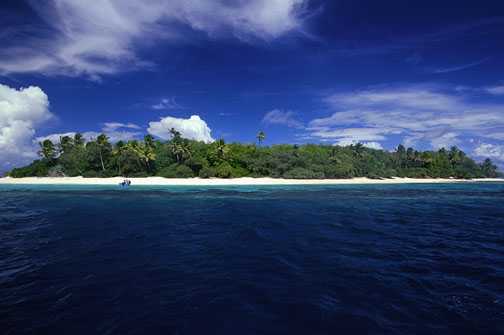







| PROGRAMMES | PROE | PROJECTS | PUBLICATIONS, LIBRARY and IRC | SITE MAP | SPREP FORUMS | WEBMAIL - Global / Local | HOME
| Sustainable Land Management | |
| > | Top |
| > | GEF SLM Projects |
| > | National Action Programme |
| > | CROP Land Resources Working Group |
| > | Events & Workshops |
| > | Linkages |
| Search |
Home > Programme > Sustainable Land Management
GEF SLM Projects
GEF-UNDP Targeted Portfolio Project on Capacity Building and Mainstreaming of Sustainable Land Management (SLM) for Least Developed Countries (LDCs) and Small Island Developing States (SIDS)
Photo: Peter Bennett
“The land and sea are like two parts of the same body. When the land is disturbed the sea is also affected”. When we care for our land we are also caring for our coastal marine life. The two cannot be separated and our survival depends on how we use them”.
|
Since time immemorial, Pacific Islanders have developed
ways to use the land and marine resources with respect and in a
way that ensures sustainability of bio-diversity, traditions and
livelihoods. Modernization, integration into the global economy,
the quest for economic development, rising populations and a host
of other factors have given rise to development and exploitation
activities that are placing increasing pressures on land resources.
In many cases such development activities have also resulted in
reduced levels of land productivity, loss of biodiversity, pollution
and rising levels of poverty. In their submissions to the World
Summit on Sustainable Development (WSSD), the Mauritius Strategy
and during participation in the UNCCD, UNCBD and UNFCCC Conference
of Parties (COP) Pacific Island Governments have continued to seek
support from development partners to address these challenges.
In recognition of the need to support LDCs and SIDS address
land degradation and achieve sustainable land management, the
GEF and its partners established the Portfolio Project to expedite
the development of GEF Medium-sized projects. Through this approach
each LDC/SIDS is able to access up to USD 500,000 GEF funding
and is required to provide co-financing on a 1:1 ratio. 14 Pacific
Island Countries that are Parties to the UNCCD and that are also
Members of GEF have responded to this opportunity and have submitted
project proposals through the UNDP as the GEF Implementing Agency.
Funding requested is to design and implement national projects
aimed at developing individual, institutional and systemic capacity
to improve planning and implementation of efforts to address
land degradation and to promote the mainstreaming of Sustainable
Land Management. |
All 14 independent countries in the Pacific Region that are Parties to the United Nations Convention to Combat Desertification or Land Degradation – www.unccd.int - have recently had their Capacity building and mainstreaming for Sustainable Land Management (SLM) Medium Sized Project (MSP) proposals endorsed by the UNDP and GEF. When implemented these SLM projects will be part of a bigger number of projects under a Portfolio Approach and implemented by developing countries throughout the world. The design and inception phase of the projects is being coordinated by Mr Hans Eschweiller, Global Project Coordinator and head of the UNDP-GEF Global Support Unit (web-site link) based in Pretoria, South Africa.
The Pacific region has benefited significantly from the support of the SLM Global Support Unit over the past years. Three regional workshops were planned and convened in the Pacific by SPREP and SPC with funding support from the GSU and advice and provision of technical information has enabled countries to embark on and complete their SLM project proposals. Financial support from the GSU has also enabled SPREP to provide in-country support and advice and to establish this dedicated link in the SPREP web-site dedicated to Sustainable Land Management. As a Portfolio Project the SLM MSP has four main Project Outcomes that are similar across all the national projects.
These include:
Outcome 1: Mainstreaming of SLM into national policies and strategies
The range of activities to be implemented under this Outcome should raise the profile of SLM throughout the countries and provide the opportunity for SLM principles to be considered and used to guide decision-making in land-use, budgeting, policy and strategy development and on-the-ground implementation of activities by communities and other national stakeholders that are involved in designing and implementing development activities on land.Outcome 2: Capacity development for SLM
Under this Outcome countries have identified a wide range of capacity development activities aimed at enhancing the capacity of national stakeholders to plan and implement activities and undertake tasks that address land degradation and contribute to SLM.Outcome 3: Development of a Medium Term Investment Plan (MTIP) and Resource Mobilization Strategy to support SLM
This outcome will strengthen capacity of national stakeholders to jointly develop a national plan and strategy aimed at identifying priority SLM issues and their related funding needs, potential funding sources and mobilizing resources in an integrated and coordinated way.Outcome 4: Development and mainstreaming of National Action Programs (NAPs) to address Land Degradation and mitigate the effects of drought.
Countries currently developing their UNCCD NAPs will incorporate this initiative under the SLM project. The project will also support countries in mainstreaming their NAPs into national development policies and strategies.
SLM Activities Identified by Countries
Click here for the table.
Support for SLM Medium Size Projects (MSP) in the Asia, Africa, Caribbean and Pacific regions
With guidance and funding support from the SLM Global Support Unit www.gsu.co.za LDC’s and SIDS in the Asia, Caribbean and the Pacific Regions have been able to obtain support from regional institutions to plan, design and implementation of SLM Projects. The following institutions have been actively supporting Countries in their respective regions with the SLM MSPs:
- Caribbean Region - Caribbean Environmental Health Institute
- South and Southeast Asia Regions - Asia Institute of Technology
- Pacific Region - Secretariat of the Pacific Regional Environment Program

